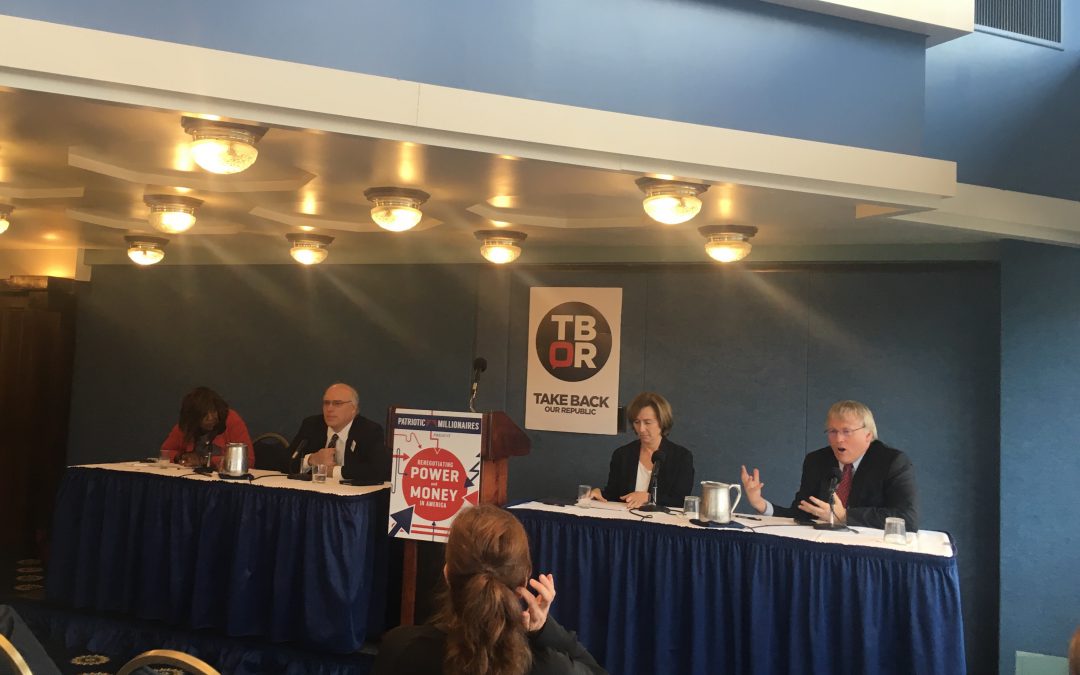WASHINGTON – As many as 100 million people are expected to watch Donald Trump and Hillary Clinton face off for the first time in a televised debate Monday night. But a panel of bipartisan activists, moderated by Federal Election Commission Commissioner Ann Ravel, has one huge question to ask the candidates: what will they do about money in politics?
NBC’s Lester Holt, the debate’s moderator, has announced that “America’s Direction” will be one of tonight’s topics. The panelists hope “America’s Direction” refers at least partially to the way national campaigns are financed. They called their panel “America’s Direction: Democracy or Oligarchy?”
Money in politics burst into the national dialogue with the Supreme Court decision Citizens United v. FEC in 2010. The ruling declared independent political spending from corporations or labor unions as a category of free speech, opening the floodgates to spending through groups called Super Pacs. These fundraising and advocacy groups have raised over $1 billion this election cycle, according to Opensecets.org.
John Pudner, founder and executive director of conservative group Take Back Our Republic, joked that, “we have one candidate with a detailed plan on money in politics who never talks about it, and another nominee who always talks about it, but doesn’t have a plan.”
Pudner said he hopes Republican candidate Donald Trump will discuss “how the system enables special interests and billionaires to buy politicians,” an assertion Trump made during a Republican debate.
On the other side of the political aisle, Wendy Fields of Democracy Initiative said grassroots organizers also recognize the need for campaign finance reform.
“They understand that the success of their issues is inextricably linked to the ability of government to fully function,” Fields said.
Pudner was asked why he, a conservative activist, thought campaign finance reform was not more widely seen as a bipartisan issue.
“Republicans thought they’d have an advantage with more money in politics,” Pudner said. “My hope is that after watching this election, they’ll realize that Democrats have learned to play this game, too.”
Pudner also pointed to what he characterizes as incremental progress.
His group worked to develop a presence in states and districts where Republicans are up for reelection and encouraged voters favoring campaign finance reform to contact their own congressmen..
Pudner said that strategy led to introduction of legislation, called the “Stop Foreign Donations Affecting Our Elections Act,” which has 51 Republican co-sponsors. He also points to the Republican Party platform, which for the first time includes items about limiting foreign influence and unverified credit card donations in politics. At the same time, he acknowledged that there are also aspects of the platform that expand the influence of money in politics.
Still, panelists at the National Press Club event said the glacial pace in Congress and within national political parties could make direct action on campaign finance reform more attractive. Some said a White House executive order may be the only way to make substantive change with regard to money in politics.
“If ever there was a time for an executive order, it would be to deal with government contractors making hundreds of billions of dollars while secretly giving money to campaigns,” Pudner said. “What more could you possibly ask for that’s ripe for corruption?”
FEC Commissioner Ravel said she was doubtful that an executive order would be effective, even if issued. She was similarly pessimistic about the FEC’s ability to effect change. She said that its structure, with six members and no more than three from the same political party, has forced the commission into stalemates.
When asked in an interview about her preferred mechanism for campaign finance progress, Ravel said to look to the states.
“More action at the state level could bring about change at the Supreme Court, and state legislation is already taking action on issues like disclosure and dark money,” Ravel said. “That might create an impetus to make change in Congress, which is ultimately what will have to happen. The president is more limited.”


